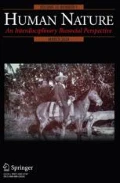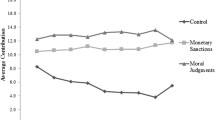Abstract
The concept of cooperative communities that enforce norm conformity through reward, as well as shaming, ridicule, and ostracism, has been central to anthropology since the work of Durkheim. Prevailing approaches from evolutionary theory explain the willingness to exert sanctions to enforce norms as self-interested behavior, while recent experimental studies suggest that altruistic rewarding and punishing—“strong reciprocity”—play an important role in promoting cooperation. This paper will use data from 308 conversations among the Ju/’hoansi (!Kung) Bushmen (a) to examine the dynamics of norm enforcement, (b) to evaluate the costs of punishment in a forager society and understand how they are reduced, and (c) to determine whether hypotheses that center on individual self-interest provide sufficient explanations for bearing the costs of norm enforcement, or whether there is evidence for strong reciprocity.
Similar content being viewed by others
References
Altman, J., and N. Peterson 1988 Rights to Game and Rights to Cash among Contemporary Australian Hunter-Gatherers. In Hunters and Gatherers; Property, Power and Ideology, T. Ingold, D. Riches, and J. Woodburn, eds. Pp. 75–94. Oxford: Berg.
Axelrod, R., and W. D. Hamilton 1981 The Evolution of Cooperation. Science 211:1390–1396.
Bahuchet, S. 1990 Food Sharing among the Pygmies of Central Africa. African Study Monographs 11:27–51.
1992 Spatial Mobility and Access to Resources among the African Pygmies. In Mobility and Territoriality, M. Casimir and A. Rao, eds. Pp. 205–257. Oxford: Berg.
Balikci, A. 1970 The Netsilik Eskimo. Garden City, New York: Natural History Press.
Barkow, J. H. 1992 Beneath New Culture Is Old Psychology. In The Adapted Mind, J. H. Barkow, L. Cosmides, and J. Tooby, eds. Pp. 627–637. Oxford: Oxford University Press.
Barnard, A., and J. Woodburn 1988 Property, Power and Ideology in Hunting-Gathering Societies: An Introduction. In Hunters and Gatherers; Property, Power and Ideology, T. Ingold, D. Riches, and J. Woodburn, eds. Pp 4–31. Oxford: Berg.
Boehm, C. 1993 Egalitarian Society and Reverse Dominance Hierarchy. Current Anthropology 34:227–254.
1996 Emergency Decisions, Cultural Selection Mechanics, and Group Selection. Current Anthropology 37:763–793.
1999 Hierarchy in the Forest: The Evolution of Egalitarian Behavior. Cambridge: Harvard University Press.
Boyd, R., and J. Henrich 2001 Why People Punish Defectors: Weak Conformist Transmission Can Stabilize Costly Enforcement of Norms in Cooperative Dilemmas. Journal of Theoretical Biology 208:79–89.
Boyd, R., and P. J. Richerson 1992 Punishment Allows for the Evolution of Cooperation (Or Anything Else) in Sizable Groups. Ethology and Sociobiology 13:171–195.
Bowles, S., and H. Gintis 2004 The Evolution of Strong Reciprocity: Cooperation in Heterogeneous Populations. Theoretical Population Biology 65:17–28.
Briggs, J. 1970 Never in Anger: Portrait of an Eskimo Family. Cambridge: Harvard University Press.
Brown, P. 1990 Big Men, Past and Present: Model, Person, Hero, Legend. Ethnology 29:97–116.
Cashdan, E. 1980 Egalitarianism among Hunters and Gatherers. American Anthropologist 82:116–120.
Clastres, P. 1972 The Guayaki. In Hunters and Gatherers Today, M. G. Bicchieri, ed. Pp. 138–174. New York: Holt, Rinehart and Winston.
1977 Society Against the State: The Leader as the Servant and the Humane Uses of Powers among the Indians of the Americas. New York: Urizen Books.
Damas, D. 1972 The Copper Eskimo. In Hunters and Gatherers Today, M. G. Bicchieri, ed. Pp. 3–50. New York: Holt, Reinhart and Winston.
Draper, P. 1976 Social and Economic Constraints on Child Life among the !Kung. In Kalahari Hunter-Gatherers, R. Lee and I. DeVore, eds. Pp. 199–217. Cambridge: Harvard University Press.
Durkheim, É. 1933 The Division of Labor in Society. New York: Free Press.
Endicott, K. 1988 Property, Power and Conflict among the Batek of Malaysia. In Hunters and Gatherers: Property, Power and Ideology, T. Ingold, D. Riches, and J. Woodburn, eds. Pp. 110–128. Oxford: Berg.
Fehr, E., and U. Fischbacher 2003a Third Party Sanctions and Social Norms. Working Paper 106. University of Zurich.
2003b The Nature of Human Altruism: Proximate Patterns and Evolutionary Origins. Working Paper. University of Zurich.
Fehr, E., and S. Gachter 2000 Altruistic Punishment in Humans. Nature 415:137–140.
Fehr, E., U. Fischbacher, and S. Gachter 2002 Strong Reciprocity, Human Cooperation and the Enforcement of Social Norms. Human Nature 13:1–25.
Flanagan, J. G. 1989 Hierarchy in Simple “Egalitarian” Societies. Annual Review of Anthropology 18:245–266.
Gardner, P. 1991 Foragers’ Pursuit of Individual Autonomy. Current Anthropology 32:543–558.
Gintis, H. 2000 Strong Reciprocity and Human Sociality. Journal of Theoretical Biology. 206:169–179.
Gintis, H., E. A. Smith and S. Bowles 2001 Costly Signaling and Cooperation Journal of Theoretical Biology 213:103–119.
Gintis, H., S. Bowles, R. Boyd, and E. Fehr 2003 Explaining Altruistic Behavior in Humans. Evolution and Human Behavior 24:153–172.
Godelier, Maurice, and Marilyn Strathern, eds. 1991 Big Men and Great Men: Personifications of Power in Melanesia. Cambridge: Cambridge University Press.
Gould, R. A. 1981 Comparative Ecology of Food-sharing in Australia and Northwest California. In Omnivorous Primates, R. Harding and G. Teleki, eds. Pp. 433–454. New York: Columbia University Press.
Griffin, P. B. 1984 All Food Is Shared: Agta Forager Acquisition, Distribution and Consumption of Meat and Plant Resources. Paper delivered at the conference on “The Sharing of Food: From Phylogeny to History,” Bad Homburg, West Germany.
Harako, R. 1976 The Mbuti as Hunters. A Study of Ecological Anthropology of the Mbuti Pygmies (Ituri, Zaire). Kyoto University African Studies 10:37–99.
1981 The Cultural Ecology of Hunting Behavior among the Mbuti Pygmies of the Ituri Forest, Zaire. In Omnivorous Primates, R. Harding and G. Teleki, eds. Pp. 499–555. New York: Columbia University Press.
Heinz, H. J. 1966 The Social Organization of the !Ko Bushmen. Unpublished Master’s thesis, Department of Anthropology, University of South Africa.
Henrich, J., R. Boyd, S. Bowles, C. Camerer, E. Fehr, H. Gintis, R. McElreath, M. Alvard, A. Barr, J. Ensminger, K. Hill, F. Gil-White, M. Gurven, F. Marlowe, J. Patton, N. Smith, and D. Tracer 2003 Economic Man in Cross-Cultural Perspective: Behavioral Experiments in 15 Small-Scale Societies. Brain and Behavioral Sciences, in preparation.
Henry, J. 1941 Jungle People: A Kaingang Tribe of the Highlands of Brazil. New York: J. J. Augustin.
Hewlett, B. 2001 The Cultural Nexus of Aka Father-Infant Bonding. In Gender in Cross-Cultural Perspective, C. B. Brettell and C. Sargent, eds. Pp. 45–56. Saddle River, New Jersey: Prentice Hall.
Howell, N. 2000 Demography of the Dobe !Kung. New York: Academic Press. (originally published in 1979)
Hrdy, S. 1999 Mother Nature: A Natural History of Mothers, Infants and Natural Selection. New York: Pantheon.
2005 Evolutionary Context of Human Development: The Cooperative Breeding Model. In Attachment and Bonding: A New Synthesis, C. S. Carter and L. Ahnert, eds. Dahlem Workshop No. 92. Cambridge: MIT Press, in press.
Ichikawa, M. 1983 An Examination of Hunting-Dependent Life of the Mbuti Pygmies, Eastern Zaire. African Studies Monographs 4:55–70.
Kelly, Robert L. 1995 The Foraging Spectrum: Diversity in Hunter-Gatherer Lifeways. Washington, D.C.: Smithsonian Institution Press.
Kent, S. 1992 Sharing in an Egalitarian Community. Man 28:479–514.
Knauft, B. 1987 Reconsidering Violence in Simple Human Societies: Homicide among the Gebusi of New Guinea. Current Anthropology 28:457–500.
Konner, M. 1975 Relations between Infants and Juveniles in Comparative Perspective. In The Origins of Behavior: Friendship and Peer Relation, Vol. 3, M. Lewis and L. Rosenblum, eds. Pp. 271–402. New York: Wiley.
Lee, R. 1976 !Kung Spatial Organization. In Kalahari Hunter-Gatherers, R. Lee and I. DeVore, eds. Pp. 73–97. Cambridge: Harvard University Press.
1979 The !Kung San: Men, Women and Work in a Foraging Society. Cambridge: Cambridge University Press.
1993 The Dobe Ju/’hoansi. New York: Harcourt Brace.
Lee, R., and I. DeVore, eds. 1968 Man the Hunter. Chicago: Aldine.
1976 Kalahari Hunter-Gatherers. Cambridge: Harvard University Press.
Madhi, N. Q. 1986 Pikhtunwali: Ostracism and Honor among the Pathan Hill Tribes. Ethology and Sociobiology 7:295–304.
Marshall, L. 1976 The !Kung of Nyae Nyae. Cambridge: Harvard University Press.
Mauss, M. 1930 The Gift, trans. by W. D. Halls. New York: Norton. (Originally published in 1924)
Meggitt, M. J. 1962 Desert People. Sydney: Angus and Robertson.
Myers, F. 1988 Burning the Truck and Holding the Country: Property, Time and the Negotiation of Identity among Pintupi Aborigines. In Hunters and Gatherers: Property, Power and Ideology, T. Ingold, D. Riches, and J. Woodburn, eds. Pp. 52–74. Oxford: Berg.
North, Douglass C. 1990 Institutions, Institutional Change and Economic Performance. Cambridge: Cambridge University Press.
Price, M. E., L. Cosmides, and J. Tooby 2002 Punitive Sentiment as an Anti-Free Rider Psychological Device. Evolution and Human Behavior 23:203–231.
Robbe, P. 1989 Le chasseur artique et son milieu: Strategies individuelles et collectives des Inuit d’Ammassalik. Doctorat d’État ès-sciences, Université Pierre et Marie Curie, Paris.
Robbins, J. 1994 Equality as Value: Ideology in Dumont, Melanesia and the West. Social Analysis 36:21–70.
Roscoe, P. 2000 New Guinea Leadership as Ethnographic Analogy: A Critical Review. Journal of Archaeological Method and Theory 7:79–126.
Rosenberg, H. 1990 Complaint Discourse, Aging, and Caregiving among the !Kung San of Botswana. In The Cultural Context of Aging: Worldwide Perspectives, J. Sokolovsky, ed. Pp. 20–41. New York: Bergin and Garvey.
Sahlins, M. 1963 Poor Man, Rich Man, Chief: Political Types in Melanesia and Polynesia. Comparative Studies in Society and History 5:285–303.
1972 Stone Age Economics. Chicago: Aldine.
Shostak, M. 1981 Nisa: The Life and Words of a !Kung Woman. Cambridge: Harvard University Press.
Silberbauer, G. B. 1981a Hunter and Habitat in the Central Kalahari Desert. Cambridge: Cambridge University Press.
1981b Hunter/Gatherers of the Central Kalahari. In Omnivorous Primates, R. Harding and G. Teleki, eds. Pp. 455–498. New York: Columbia University Press.
Sober, Elliott, and David S. Wilson 1998 Unto Others: The Evolution and Psychology of Unselfish Behavior. Cambridge: Harvard University Press.
Sugawara, Kazuyoshi 1988 Visiting Relations and Social Interaction between Residential Groups of Kalahari San: Hunter-Gatherer Camp as Micro-territory. African Studies Monographs 8:173–211.
1997 “Egalitarian” Attitude in Everyday Conversations among the /Gui. In The Proceedings of the Khoisan Identities and Cultural Heritage Conference. Pp. 237–240. Cape Town: Institute for Historical Research, University of the Western Cape/Infosource CC.
Tanaka, J. 1980 The San Hunter-Gatherers of the Kalahari. University of Tokyo Press, Tokyo.
Testart, A. 1982 The Significance of Food Storage among Hunter-Gatherers: Residence Patterns, Population Densities, and Social Inequalities. Current Anthropology 23:523–530.
Trivers, R. L. 1971 The Evolution of Reciprocal Altruism. Quarterly Review of Biology 46:35–57.
Turillo, C., R. Folger, J. Lavelle, E. Umphress, and J. Gee 2002 Is Virtue Its Own Reward? Self-sacrificial Decisions for the Sake of Fairness. Organizational Behavior and Human Decision Processes 89:839–865.
Turnbull, C. 1965 Wayward Servants: The Two Worlds of African Pygmies. Westport, Connecticut: Green wood Press.
Tuzin, D. F. 2001 Social Complexity in the Making: A Case Study among the Arapesh of New Guinea. New York: Routledge.
von Bremen, V. 1991 Zwischen Anpassung und Aneignung: Zur Problematik von Wildbeuter-Gesellschaften im Modernen Weltsystem am Beispiel der Ayoreode. Munich: Anacon.
Watson, James B. 1971 Tairora: The Politics of Despotism in a Small Society. In Politics in New Guinea, B. R. Lawrence and P. Lawrence, eds. Pp. 224–275. Nedlands: University of Western Australian Press.
Wiessner, P. 1977 Hxaro: A Regional System of Reciprocity for Reducing Risk among the !Kung San. Ann Arbor: University Microfilms.
1982 Risk, Reciprocity and Social Influences on !Kung San Economics. In Politics and History in Band Societies, E. Leacock and R. Lee, eds. Pp. 61–84. Cambridge: Cambridge University Press.
1986 !Kung San Networks in a Generational Perspective. In The Past and Future of !Kung Ethnography: Essays on Honor of Lorna Marshall, M. Biesele, R. Gordon, and R. Lee, eds. Pp. 103–136. Hamburg: Helmut Buske.
1994 Pathways of the Past: !Kung San Hxaro Exchange and History. In Überlebensstrategien in Afrika, M. Bollig and Frank Klees, eds. Pp. 101–124. Colloquium Africanum 1. Cologne: Heinrich-Barth Institut.
1996 Leveling the Hunter: Constraints on the Status Quest in Foraging Societies. In Food and the Status Quest, P. Wiessner and W. Schiefenhövel, eds. Pp. 171–191. Oxford: Berghahn Books.
2002a The Vines of Complexity: Egalitarian Structures and the Emergence of Institutionalized Inequality among the Enga, Papua New Guinea. Current Anthropology 43:233–269.
2002b Hunting, Healing and Hxaro Exchange: A Long-Term Perspective on !Kung (Ju/’hoansi) Large Game Hunting. Evolution and Human Behavior 23:407–436.
2004 Owners of the Future? Calories, Cash, Casualties and Self-sufficiency in the Nyae Nyae Area between 1996–2003. Review of Visual Anthropology 19:149–159.
Williams, B. J. 1974 A Model of Band Society. American Antiquity 34(4). Society for American Archaeology Memoir 29.
Wilmsen, E. 1989a Land Filled with Flies. Chicago: University of Chicago Press.
1989b Those Who Have Each Other: San Relations to Land. In We Are Here: Politics of Aboriginal Land Tenure, E. Wilmsen, ed. Pp. 43–67. Berkeley: University of California Press.
Winterhalder, B. 1986 Diet Choice, Risk and Food Sharing in a Stochastic Environment. Journal of Anthropological Archaeology 5:369–392.
Woodburn, J. 1982 Egalitarian Societies. Man 17:431–451.
Yengoyan, A. 1968 Demographic and Ecological Influences on Aboriginal Australian Marriage Sections. In Man the Hunter, R. B. Lee and I. DeVore, eds. Pp. 185–189. Chicago: Aldine.
Author information
Authors and Affiliations
Corresponding author
Additional information
Polly Wiessner is a professor of anthropology at the University of Utah. She has carried out fieldwork with the Ju/’hoansi of the Kalahari for the past 30 years on social networks, style in artifacts, economy, population, nutrition, and social change. She has also worked among the Enga of Papua New Guinea since 1985 on the oral history of exchange, ritual, and warfare.
Rights and permissions
About this article
Cite this article
Wiessner, P. Norm enforcement among the Ju/’hoansi Bushmen. Hum Nat 16, 115–145 (2005). https://doi.org/10.1007/s12110-005-1000-9
Received:
Revised:
Issue Date:
DOI: https://doi.org/10.1007/s12110-005-1000-9




